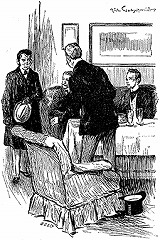“When Mrs. Charpentier paused,” the detective continued, “I saw that the whole case hung upon one point. Fixing her with my eye in a way which I always found effective with women, I asked her at what hour her son returned.
“‘I do not know,’ she answered.
“‘Not know?’
“‘No; he has a latchkey, and he let himself in.’
“‘After you went to bed?’
“‘Yes.’
“‘When did you go to bed?’
“‘About eleven.’
“‘So your son was gone at least two hours?’
“‘Yes.’
“‘Possibly four or five?’
“‘Yes.’
“‘What was he doing during that time?’
“‘I do not know,’ she answered, turning white to her very lips.
“Of course after that there was nothing more to be done. I found out where Lieutenant Charpentier was, took two officers with me, and arrested him. When I touched him on the shoulder and warned him to come quietly with us, he answered us as bold as brass, ‘I suppose you are arresting me for being concerned in the death of that scoundrel Drebber,’ he said. We had said nothing to him about it, so that his alluding to it had a most suspicious aspect.”
“Very,” said Holmes.
“He still carried the heavy stick which the mother described him as having with him when he followed Drebber. It was a stout oak cudgel.”
“What is your theory, then?”
“Well, my theory is that he followed Drebber as far as the Brixton Road. When there, a fresh altercation arose between them, in the course of which Drebber received a blow from the stick, in the pit of the stomach perhaps, which killed him without leaving any mark. The night was so wet that no one was about, so Charpentier dragged the body of his victim into the empty house. As to the candle, and the blood, and the writing on the wall, and the ring, they may all be so many tricks to throw the police on to the wrong scent.”
“Well done!” said Holmes in an encouraging voice. “Really, Gregson, you are getting along. We shall make something of you yet.”
“I flatter myself that I have managed it rather neatly,” the detective answered, proudly. “The young man volunteered a statement, in which he said that after following Drebber some time, the latter perceived him, and took a cab in order to get away from him. On his way home he met an old shipmate, and took a long walk with him. On being asked where this old shipmate lived, he was unable to give any satisfactory reply. I think the whole case fits together uncommonly well. What amuses me is to think of Lestrade, who had started off upon the wrong scent. I am afraid he won’t make much of it. Why, by Jove, here’s the very man himself!”
It was indeed Lestrade, who had ascended the stairs while we were talking, and who now entered the room. The assurance and jauntiness which generally marked his demeanour and dress were, however, wanting. His face was disturbed and troubled, while his clothes were disarranged and untidy. He had evidently come with the intention of consulting with Sherlock Holmes, for on perceiving his colleague he appeared to be embarrassed and put out. He stood in the centre of the room, fumbling nervously with his hat and uncertain what to do. “This is a most extraordinary case,” he said at last - “a most incomprehensible affair.”

“Ah, you find it so, Mr. Lestrade!” cried Gregson, triumphantly. “I thought you would come to that conclusion. Have you managed to find the secretary, Mr. Joseph Stangerson?”
“The secretary, Mr. Joseph Stangerson,” said Lestrade, gravely, “was murdered at Halliday’s Private Hotel about six o’clock this morning.”